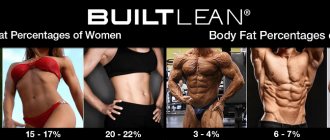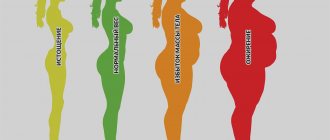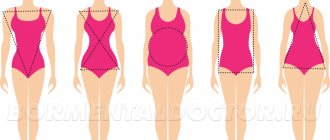Excess weight is a problem for most modern people. The pathology begins in early childhood, but until a certain age, the growth factor of subcutaneous fatty tissue is restrained by high energy costs. For an adult, excess body weight is a high risk of early death from cardiovascular diseases and diabetes.
Timely treatment and prevention of excess weight can reduce risk factors and prevent this pathology from becoming obesity. This material discusses the main reasons for the growth of subcutaneous fatty tissue and ways to effectively combat this negative phenomenon. It also talks about the most expected negative consequences for health.
If you are overweight, we recommend making an appointment with a doctor at our manual therapy clinic. Your initial consultation will be completely free. During your appointment, you will learn about the potential causes of weight gain in your individual case and receive effective recommendations for weight loss.
Causes of excess weight
Potential causes of excess weight always include two main negative factors:
- eating a lot of calories;
- maintaining a lifestyle that requires much less calories to maintain than is consumed in food.
All excess calories are utilized by the body according to two schemes. The first is observed in a healthy person with high metabolic potential. He has a sufficient amount of digestive enzymes and muscle tissue breaks down a large amount of glycogen. In this case, excess calories are simply excreted in the feces as ballast substances. The person does not gain weight.
The second story is related to the so-called slow metabolism. A decrease in metabolic rate occurs for a number of reasons. The main one is diet and limiting calorie intake. In response to this, the body reduces the rate of metabolic reactions. In such people, energy from glycogen deposited in muscles is not activated and there is no need to replenish its reserves. This is what becomes the cause of primary insulin resistance and a risk factor for the development of diabetes. In such cases, excess calories are utilized by converting them into subcutaneous fat.
Thus, in a healthy person, the body creates potential energy reserves in the form of glycogen, and in a patient, in the form of subcutaneous fat.
Here are some reasons that can lead to a slowdown in metabolism:
- deficiency of lipoic acid and a number of essential vitamins;
- disruption of the process of carnitine production (a substance responsible for the utilization of fats);
- insufficient enzymatic activity of gastric juice;
- dysfunction of the gallbladder, as a result of which the necessary amount of bile is not released to break down all the fats in the cavity of the small intestine;
- regular constipation and disruption of the large intestine;
- improper distribution of food volume during the day (it is recommended to eat most of it in the first half of the day, and 3 hours before going to bed not to drink anything other than clean water);
- excess carbohydrate content in the diet (this factor negatively affects the absorption of proteins and fats);
- diseases of the pancreas and thyroid gland;
- excessive function of the pituitary gland and pineal gland.
It is important to understand that the basis for the accumulation of excess weight is the factor of poor nutrition. Therefore, its normalization is necessary. First of all, you need to pay attention to the ratio of fats, proteins and carbohydrates. They all have different potential calorie content and can partially replace each other. But in principle, the body does not require any costs to break down carbohydrates - they break down perfectly and are absorbed practically without enzymes. For the breakdown of fats, certain conditions must be applied. But it is very difficult to break down proteins and extract all the calories from them. This requires the production of a number of proteolytic enzymes. Therefore, most people have a pronounced bias in their diet towards carbohydrates. From them it is easiest to extract the energy necessary for the modern pace of life. Unfortunately, the calorie content of these products is so high that you quickly gain excess weight.
Preventive measures
- Dietary disorders. Taking into account the fact that the basis of any form of obesity is, in one way or another, the food taken, attention should be paid to quality products consumed in rational quantities. If you neglect this factor, weight loss will not occur. You can't give up food completely. Many people claim that they lose weight thanks to dry fasting (absolute), but this only harms the human body. If specific centers in the hypothalamus are constantly irritated due to starvation, this will lead to breakdowns - the body will require even more fuel in order to preserve reserves for future use. It is necessary to control sufficient calorie intake per day. For a man, the norm is 22.3 kcal per kilogram of body weight, and for a woman – 21.9. If you limit your daily diet by 100 calories every day, then you will lose at least 10 g of weight every day, unless you do additional sports. If you do nothing and reduce your diet, then in three months you can lose a kilogram. To do this, you must exclude easily digestible carbohydrates and fatty foods to provide your body with optimal protein content, vitamin complex, and microelements. It is also not recommended to salt foods to avoid water retention.
- Bad habits. Alcohol abuse is associated with weight gain. When consuming alcohol, the appetite increases, as a result of which a person often snacks. Sensitivity in the saturation center of the hypothalamus decreases. And the drinks themselves based on ethyl alcohol are high-energy and high-calorie.
- Physical exercise. To balance the amount of accumulated and lost kilocalories, their intake should be reduced with an increase in consumption. Consumption increases through sports and other active activities. You need to take into account your own state of the body, since exhausting training exercises are not indicated for every person, especially for people with chronic diseases. But daily long walks, jogging, cycling with sports games are recommended for almost everyone. The most optimal preventive measure is visiting the pool. Swimming promotes active calorie loss. Water allows you to reduce weight (but not mass) when losing weight. If the body comes into contact with water, heat output increases, promoting fat breakdown.
- Psychological condition. Constant drowsiness due to lack of sleep, depression, and stressful situations contribute to an increase in active substances that increase appetite and encourage eating.
- Diseases. Type 2 diabetes mellitus, problems with the thyroid gland, gastroenterocolitis, and hormonal imbalances require treatment that prevents the onset of obesity.
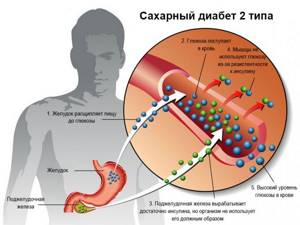
Be sure to read: Effective tips on how to remove belly fat for a man
These preventive measures require certain restrictions, methods and rules. This means that losing weight on your own is often difficult.
You will need the special help of a nutritionist who will first check the body and then write out a complete diet and exercise plan.
Problems and consequences of excess weight
The main problems of excess weight lie in the disruption of metabolic and endocrine processes in the human body. If the mechanism for recycling excess calories described above is disrupted, then it will be very difficult to restore its operation later. But the consequences of being overweight can be catastrophic. Let us name only the most formidable pathological changes occurring in the human body:
- adipose tissue tends to produce female sex hormones necessary during pregnancy for the growth and development of the fetus (in an adult, these substances can provoke the growth of tumor tumors, such as lipoma or wen);
- excess cholesterol is deposited on the walls of blood and lymph vessels, this significantly increases the risk of developing myocardial infarction and ischemic cerebral stroke at a young age (up to 45 years);
- deposition of adipose tissue in liver cells leads to fatty degeneration of this organ, the body begins to suffer from toxins and waste, severe forms of eczema and psoriasis arise;
- with long-term fatty degeneration of the liver, cirrhosis develops, from which the patient dies;
- the excretory function of the kidneys is impaired;
- a large amount of stress hormones are produced;
- arterial hypertension occurs;
- all internal organs of the abdominal cavity are displaced against the background of visceral obesity - this leads to disruption of the functioning of the gallbladder, liver, small and large intestines;
- fertility in women and reproductive capacity in men decreases;
- the functioning of the pancreas is disrupted and diabetes mellitus develops;
- the cartilage tissue of large joints of the lower extremities and intervertebral discs is quickly destroyed;
- the risk of disability increases due to deforming osteoarthritis of the hip and knee joints and numerous intervertebral hernias.
Some effects of excess body weight may be irreversible. For example, if the patient has already developed stage three osteoarthritis, then it will be impossible to restore the integrity of the cartilage tissue in the joint using conservative methods. It is highly likely that he will require endoprosthetic surgery.
Nutritional Diet Requirements
Usually people are accustomed to the fact that diet is a method of weight loss. But there are also diets that are designed to gain it. Often various diseases lead to weight loss, and therefore you need to fight it. A nutritious diet is designed specifically to solve this problem.
A special feature of the method is that the diet contains many more calories than usual. The main requirement of the diet is to eat 2100-3400 energy units daily. The calorie content of the diet should be increased gradually, adding 200-300 calories every day. The technique can be followed from 7 days to 1 month. It all depends on how many kilograms you need to gain.
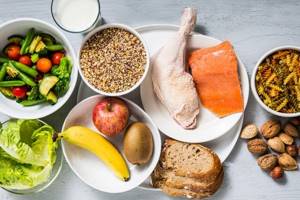
The nutritional method includes the main product - meat - in the diet. The menu is also varied with vegetables, eggs, cheeses, cereals and other high-calorie foods. Since this menu is especially high in calories, it is not forbidden to eat your favorite foods, including sweets or desserts
But it’s better, of course, to focus on healthy foods. This way the body will receive all the necessary substances and components that are needed for its normal functioning.
You should start such a diet gradually so as not to encounter such troubles as a heavy load on the digestive system. So, instead of benefit, you can greatly harm the body. At the same time, we must not forget that it is recommended to drink at least 1.5 liters of clean still water per day. You definitely need to rest properly, sleep normally, and do physical activity. Typically, in 1 week you can gain 3-5 kilograms of weight.
Diagnosis of excess weight
Clinical diagnosis of excess weight begins with calculating body mass index. Using its parameters, you can determine whether a person is obese. Then the doctor prescribes a series of studies aimed at finding the potential cause of this pathology. Also, at the same time, the risk of developing complications of excess weight is eliminated. The patient undergoes a general and biochemical blood test, undergoes an ECG, ultrasound, and radiography. Consultation with an endocrinologist is required, since excess weight may be associated with dysfunction of the thyroid and pancreas, parathyroid glands, pineal gland and pituitary gland.
If you need a diagnosis of excess weight and help in its safe correction, then you can sign up for a free initial consultation at our manual therapy clinic. Here you will be given comprehensive individual recommendations.
Solving psychological problems
Not all causes of obesity are due to human physiology. His psyche plays an important role, acting as a trigger for the appearance of excess weight. To successfully combat the prerequisites for obesity, you need to know them.
Psychological problems that lead to obesity:
Filling a spiritual emptiness in the absence of other interests;
Finding peace of mind instead of active participation in society;
The desire to gain significance by feeding other family members;
“Eating” stress, obtaining the hormone of joy – serotonin;
Suppression of sexuality under the “veil of fat”;
Replacement of missing emotions with food, food is a surrogate for love and attention;
Ignoring the needs of the body, which it compensates for with a kind of protection;
Traditional gatherings during lunch breaks, when meeting with family and friends.
By solving at least partially the problem associated with the psychological aspect of obesity, weight gain can be prevented.
Fighting excess weight: what to do and how to get rid of it
It is important to understand that improper control of excess weight can lead to the development of serious diseases. Under no circumstances should you take any pharmacological medications without a doctor’s prescription. All of them literally kill the endocrine system and completely stop the natural metabolism in the human body. Many drugs are aimed at total dehydration of the body. This is fraught with an increase in blood clotting, thrombosis, collagen breakdown and rapid destruction of the internal vascular wall, cartilage tissue, etc.
The next thing you should not do if you are overweight is to starve, sharply reduce your caloric intake and “go on a diet.” These procedures also have a negative effect on metabolism and only aggravate the problem.
How can you get rid of excess weight if you can’t fast and take pharmacological drugs designed to break down or block fat? This is not easy to do, but it is possible.
What do we have to do
If you reduce the number of dishes in your daily diet that have enough fat and carbon content, you can reduce your weight. As already stated above, you can lose weight up to 5 kg only with restrictions alone. After calculating the products consumed, maintaining your weight within normal limits will be guaranteed. You can arrange fasting days once a week, when nothing except water is taken.
On what basis are the products used?
- Select foods that take longer to digest due to their low-fat protein content. This makes you feel full for much longer. To achieve normal protein content (up to 100 g), it is recommended to include legumes, lean meat products, eggs, cottage cheese and low-fat cheeses in the diet;
- Carbohydrates should be consumed in minimal quantities as they are the main source of fat. You can replace it with food containing fiber;
- Fatty gravies and soups are excluded from the diet;
- Salt and sugar should not be consumed, they inhibit the normalization of water balance;
- In general, the amount of oil per day should not exceed 50 g. This applies to butter, vegetable oil, and olive oil;
- Reduce consumption of bread, potatoes;
- You can’t drink sweet carbonated drinks, even store-bought juices can result in extra pounds;
- Include in your diet foods that help break down fats or remove excess toxins (beets, watermelon, grapefruit).

Many people who are losing weight note that it is easier for them to go on a diet with the whole family, so that they do not have the opportunity to eat unhealthy food and be distracted by what their relatives are eating.
The exception is people on a strict diet due to chronic diseases.
What is the rule for reducing the amount of food consumed:
- You should try to chew with less intensity, enjoying each bite. When food is processed by saliva, the moment of its digestion begins long before it enters the esophagus. This guarantees an increase in satiety by satisfying emotional hunger;
- To avoid overeating, small dishes are used for eating;
- Dividing food into small portions several times a day can become a habit4
- A special table is kept where the calorie intake is noted;
- When drinking natural green tea, catechins effectively burn excess calories.

Be sure to read: How can you eat carbohydrates while losing weight? Grocery list
Restriction in food must necessarily go in parallel with physical activity, otherwise muscle tone will be lost, and the muscle itself will atrophy, while the skin may become drier and flabby.
Correction and treatment of excess weight
In our manual therapy clinic, excess weight treatment is carried out using individually developed safe schemes and methods. Correction of excess weight begins with the joint work of the patient and an experienced nutritionist. Depending on a person’s body weight and lifestyle, a specialist develops a diet with the correct ratio of calories, proteins, fats and carbohydrates.
The next step in treatment is developing a physical activity program. These can be sets of physical exercises aimed at accelerating the process of breakdown of subcutaneous fat tissue. But most often, at the initial stage, the doctor strives to increase the tone of muscle tissue, since it requires enormous energy expenditure for its full functioning.
Reflexology techniques are used to speed up metabolism. Impact on biologically active points on the human body allows you to restore metabolism and speed up the process of normalizing body weight.
Treatment of excess body weight with massage and osteopathy gives excellent results. Manual influence on subcutaneous fatty tissue activates metabolic processes in it. Strengthening microcirculation of blood and lymphatic fluid ensures the breakdown and removal of fats. There is a rapid decrease in body volume.
In some cases, electromyostimulation and other methods of physiotherapy are additionally used. But for most patients, a combination of diet therapy, reflexology, physical therapy and massage gives positive results.
If you need safe and effective treatment for excess weight, we recommend that you contact our doctors. Already during the initial free consultation, you will receive a huge amount of useful information that will help you stop gaining excess weight and start the process of normalizing it without drugs and grueling physical activity.
Sample menu of proper nutrition for weight loss for a week
I will give an example of a proper nutrition menu for weight loss. The number of products you have may be different. If you are a man or woman who plays sports, or you do not need to lose weight, then the amount of food should be increased by 500-1000 kcal per day. You can include your favorite foods on the menu, the main thing is to follow the basic principles of proper nutrition.
Important: think through your menu for the next day in advance so you don’t have to run around the city looking for food!
| Breakfast | Snack | Dinner | Snack | Dinner | Snack |
| omelette of 5-7 egg whites, 200 gr. fresh vegetables, 2 tbsp. spoons of buckwheat | 1 banana | 30 gr. whole grain bread, 200 gr. steamed vegetables + 150 gr. Chicken | 1 tbsp. kefir | 300 gr. fresh salad + 100 gr. seafood | 1 tbsp. kefir (if you go to bed late) |
| soy cheese tofu 100 gr. + fresh salad 300 gr. | 100 gr. low-fat cottage cheese | 2 tbsp. spoons of unpolished rice + 300 gr. vegetables + 100-200 gr. lean meat | 100 gr. cottage cheese | 300 gr. stewed vegetables + 150 gr. chicken breast | 1 tbsp. kefir |
| buckwheat porridge 50 gr. + fresh salad 200 gr. + 100 gr. chicken breast | 1 apple + 50 gr. low-fat cottage cheese | vegetable soup 300 gr. + 30 gr. black bread + 200 gr. vegetables + 100 gr. fish | 1 tbsp. ryazhenka | 300 gr. vegetables + 150-180 gr. baked fish | 1 tbsp. kefir |
| whole grain oatmeal 3 tbsp. spoons + fresh salad 200-300 gr. + 100 gr. fish | 1 tbsp. kefir + 150 gr. berries | 100 gr. boiled beans + 100 gr. chicken breast + vegetable salad | 1 boiled egg + grapefruit | 300 gr. vegetables + 100 gr. turkeys | 1 tbsp. kefir |
| oatmeal 100 gr. + dried fruits or fruits 100 gr. | 1 boiled egg + vegetable (cucumber, tomato, pepper, etc.) | durum spaghetti 70 gr. + 100 gr. beef + fresh salad 200 gr. | 1 egg + 1 vegetable | 300 gr. vegetables + 100-150 gr. cottage cheese | 1 tbsp. kefir |
| 50 gr. cheese + 1 tbsp. 2% fermented baked milk + fresh salad 300 gr. | 10 pieces. almonds | 2 tbsp. spoons of buckwheat + salad + 150 gr. fish | 50 gr. cottage cheese + 150 gr. fresh berries | 300 gr. vegetables + chopped chicken cutlet 100 gr. | 1 tbsp. kefir |
| cottage cheese 150 gr. + fresh salad 200 gr. + greens | 3-5 pcs. walnuts | 100 gr. lentils + baked cutlet 100 gr. + vegetables 200 gr. | 1 tbsp. milk | steamed fish cutlet 150 gr. + fresh salad | 1 tbsp. kefir |
I wish everyone to be healthy, energetic and cheerful!
Prevention of excess weight
Prevention of excess weight is necessary from early childhood. The introduction of healthy eating habits is the basis for future human security. If a child from early childhood is accustomed to eating a predominant amount of foods with a low glycemic index and does not have a developed addiction to high-carbohydrate foods, then in the future he will not need weight correction.
In an adult, the prevention of excess weight begins with the development of a correct, complete diet, which, in terms of its caloric content, will correspond to the lifestyle that he leads. So, if a person has a predominantly sedentary job and does not engage in active sports, then his daily caloric intake should not exceed 2200 kcal. And for those who work as a loader or are fond of outdoor sports games such as volleyball, football and play them every day, the diet can be 3300 - 3500 kcal.
Daily physical activity also helps prevent obesity. During its work, muscle tissue consumes a large amount of energy, releases glycogen and activates the endocrine system.
Proper nutrition and exercise are two effective ways to prevent obesity. There are no others.
Physical activity as a method of preventing obesity
To properly organize physical activity, you need to know the principles of energy supply for the body.
The nature of energy supply during muscle exercise:
- In the first 5-7 minutes, carbohydrates are extracted and utilized from the blood entering the muscles.
- Between 15 and 20 minutes, the muscles are provided with energy from carbohydrates obtained during the breakdown of glycogen in the muscles and in the liver.
- With exercise lasting longer than 20 minutes, energy is delivered to the muscles from the fat mass.
Therefore, the optimal time for physical activity and exercise is beyond the specified time. Only then will fat mass not increase, but, on the contrary, decrease. To get this effect, you need to move intensely enough so that your heart rate during and after exercise is 110-140 beats per minute.
Cyclic sports or physical exercises are best suited for the prevention of obesity:
- Cross-country skiing,
- Swimming,
- Walking,
- Run,
An untrained person should not immediately begin intense exercise. It is better to start with healthy walking at a fast pace, gradually moving on to running. A prerequisite is control over your condition, the load on the cardiovascular system, ligaments and tendons.
It may take 4 to 6 months for an untrained person to increase their exercise time to 40 minutes. In this case, you need to exercise at least 3-4 times a week. It is quite possible that body weight will not decrease during intense training. This is explained by the fact that muscle tissue takes the place of adipose tissue, reducing the amount of visceral fat - a provoking factor of atherosclerosis and many other diseases. At the same time, you need to adhere to a rational diet and fill your grocery basket with only healthy products.
Example of a daily diet

- 7.00 - we recommend starting your morning with natural sugar-free yogurt, with fresh or frozen fruit.
- 10.00 - instead of second breakfast, you can have a cup of coffee.
- 12:00 – For lunch, make a vegetable salad with legumes, whole grains and leafy greens that will provide a healthy dose of nutrients, protein and dietary fiber.
- 14.00 - you should drink a glass of water (this should be done at least 6 times a day).
- 16.00 - have a snack with a handful of grapes.
- 19.00 - chicken breast with grilled or steamed vegetables.
- 22.00 - a glass of milk before bed will prepare the body for sleep.
- 23.00 - lights out.

